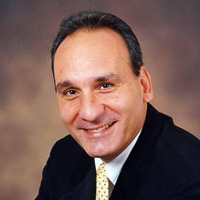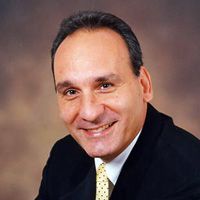You Can't Escape Emotions, So Harness Them for Good
Investors and retirement savers are not robots. We are thinking, feeling, imperfect creatures. And that's not all bad.

Profit and prosper with the best of Kiplinger's advice on investing, taxes, retirement, personal finance and much more. Delivered daily. Enter your email in the box and click Sign Me Up.
You are now subscribed
Your newsletter sign-up was successful
Want to add more newsletters?

Delivered daily
Kiplinger Today
Profit and prosper with the best of Kiplinger's advice on investing, taxes, retirement, personal finance and much more delivered daily. Smart money moves start here.

Sent five days a week
Kiplinger A Step Ahead
Get practical help to make better financial decisions in your everyday life, from spending to savings on top deals.

Delivered daily
Kiplinger Closing Bell
Get today's biggest financial and investing headlines delivered to your inbox every day the U.S. stock market is open.

Sent twice a week
Kiplinger Adviser Intel
Financial pros across the country share best practices and fresh tactics to preserve and grow your wealth.

Delivered weekly
Kiplinger Tax Tips
Trim your federal and state tax bills with practical tax-planning and tax-cutting strategies.

Sent twice a week
Kiplinger Retirement Tips
Your twice-a-week guide to planning and enjoying a financially secure and richly rewarding retirement

Sent bimonthly.
Kiplinger Adviser Angle
Insights for advisers, wealth managers and other financial professionals.

Sent twice a week
Kiplinger Investing Weekly
Your twice-a-week roundup of promising stocks, funds, companies and industries you should consider, ones you should avoid, and why.

Sent weekly for six weeks
Kiplinger Invest for Retirement
Your step-by-step six-part series on how to invest for retirement, from devising a successful strategy to exactly which investments to choose.
We all like to think we make our decisions based on facts and logic. But unless you’re a robot, that isn’t the case.
Emotions always play some role in the choices we make, including — maybe even especially — when it comes to our money. And it’s no wonder, when so much of our self-worth is tied to our net worth.
That’s why the financial industry is so interested in the fields of behavioral economics and behavioral finance, studying the social, cognitive and emotional factors that can lead investors to depart from rational decision-making.
From just $107.88 $24.99 for Kiplinger Personal Finance
Become a smarter, better informed investor. Subscribe from just $107.88 $24.99, plus get up to 4 Special Issues

Sign up for Kiplinger’s Free Newsletters
Profit and prosper with the best of expert advice on investing, taxes, retirement, personal finance and more - straight to your e-mail.
Profit and prosper with the best of expert advice - straight to your e-mail.
No one is perfect
Researchers have identified dozens of behavioral biases that can come into play as investors try to determine the best ways to both grow and protect their assets. There’s pride, regret, anger, fear and greed, just to name a few. Unfortunately, those emotions can lead to actions that are more destructive than constructive. If you can learn to contain them, you’re bound to lessen the negative impact on your portfolio.
That’s easier said than done, of course. Or, as Richard Thaler, the winner of the 2017 Nobel Prize in economics, puts it, we humans are consistently irrational.
Oh, how we hate to lose
Much of this irrationality can be attributed to the effect that losses have on our emotions — what researchers call loss-aversion bias. We feel the pain of a loss much more than the joy of a gain — particularly when it comes to our hard-earned money. And that can trip us up. For example, an investor might not be willing to get rid of a bad investment and switch over to a product or strategy with more potential.
The lemming factor
Another common mistake is to follow the herd. Again, it’s human nature to go with the latest trend; if everybody’s doing it, it must be a winner, right? Not necessarily. When investing your nest egg, you should do what’s best based on your unique goals. Many people put their money into investments without regard to how long it will take to recover from a loss — which can be devastating if you’re in or near retirement. Or they make an investment, then over-monitor and agonize about it, which could lead to buying high and selling low. “Fear of missing out” can take a chunk out of a portfolio at the most inopportune time.
In bull markets we trust
And then there’s the kind of over-confidence we’re seeing a lot of these days, thanks to this record-setting bull market. This is another significant problem for pre-retirees, who should be transitioning from the accumulation phase of their investing career to the preservation and distribution phase. It’s imperative that they move to a portfolio that is structured to last the entirety of their retirement — which could be 25 years or more. The impact of a downturn can be much more calamitous in retirement than when you’re working, especially if you’re depending on your investments for a portion of your income.
You’re likely wondering at this point if there’s some way you can channel Star Trek’s Mr. Spock, putting emotions aside and becoming super-rational — at least when it comes to your finances.
Probably not.
And that’s not all bad. Your brain uses emotions to convince you to act in a certain manner. So why not harness those feelings and use them in a positive way? If you are feeling anxious regarding current market trends, talk it out with your financial professional. The main thing is to keep your sights on your retirement income goals and refrain from making changes that don’t align with those goals.
The bottom line
No matter what’s driving you — fear, greed, pride, envy — do your homework, ask questions, read the fine print. And seek help from a financial professional, preferably a fiduciary who specializes in creating income in retirement and can help you protect your nest egg and your future income.
Kim Franke-Folstad contributed to this article.
Profit and prosper with the best of Kiplinger's advice on investing, taxes, retirement, personal finance and much more. Delivered daily. Enter your email in the box and click Sign Me Up.

Dr. Richard Pucciarelli is the president and founder of Carolina Retirement Resources Inc. He has over 15 years experience serving retirees and pre-retirees in planning for and protecting their financial futures. Pucciarelli is an Investment Adviser Representative and a licensed insurance professional. He hosts the "Financial Symphony" show on WBT Radio 1110 AM every Saturday morning at 11 a.m.
-
 5 Vince Lombardi Quotes Retirees Should Live By
5 Vince Lombardi Quotes Retirees Should Live ByThe iconic football coach's philosophy can help retirees win at the game of life.
-
 The $200,000 Olympic 'Pension' is a Retirement Game-Changer for Team USA
The $200,000 Olympic 'Pension' is a Retirement Game-Changer for Team USAThe donation by financier Ross Stevens is meant to be a "retirement program" for Team USA Olympic and Paralympic athletes.
-
 10 Cheapest Places to Live in Colorado
10 Cheapest Places to Live in ColoradoProperty Tax Looking for a cozy cabin near the slopes? These Colorado counties combine reasonable house prices with the state's lowest property tax bills.
-
 Don't Bury Your Kids in Taxes: How to Position Your Investments to Help Create More Wealth for Them
Don't Bury Your Kids in Taxes: How to Position Your Investments to Help Create More Wealth for ThemTo minimize your heirs' tax burden, focus on aligning your investment account types and assets with your estate plan, and pay attention to the impact of RMDs.
-
 Are You 'Too Old' to Benefit From an Annuity?
Are You 'Too Old' to Benefit From an Annuity?Probably not, even if you're in your 70s or 80s, but it depends on your circumstances and the kind of annuity you're considering.
-
 In Your 50s and Seeing Retirement in the Distance? What You Do Now Can Make a Significant Impact
In Your 50s and Seeing Retirement in the Distance? What You Do Now Can Make a Significant ImpactThis is the perfect time to assess whether your retirement planning is on track and determine what steps you need to take if it's not.
-
 Your Retirement Isn't Set in Stone, But It Can Be a Work of Art
Your Retirement Isn't Set in Stone, But It Can Be a Work of ArtSetting and forgetting your retirement plan will make it hard to cope with life's challenges. Instead, consider redrawing and refining your plan as you go.
-
 The Bear Market Protocol: 3 Strategies to Consider in a Down Market
The Bear Market Protocol: 3 Strategies to Consider in a Down MarketThe Bear Market Protocol: 3 Strategies for a Down Market From buying the dip to strategic Roth conversions, there are several ways to use a bear market to your advantage — once you get over the fear factor.
-
 For the 2% Club, the Guardrails Approach and the 4% Rule Do Not Work: Here's What Works Instead
For the 2% Club, the Guardrails Approach and the 4% Rule Do Not Work: Here's What Works InsteadFor retirees with a pension, traditional withdrawal rules could be too restrictive. You need a tailored income plan that is much more flexible and realistic.
-
 Retiring Next Year? Now Is the Time to Start Designing What Your Retirement Will Look Like
Retiring Next Year? Now Is the Time to Start Designing What Your Retirement Will Look LikeThis is when you should be shifting your focus from growing your portfolio to designing an income and tax strategy that aligns your resources with your purpose.
-
 I'm a Financial Planner: This Layered Approach for Your Retirement Money Can Help Lower Your Stress
I'm a Financial Planner: This Layered Approach for Your Retirement Money Can Help Lower Your StressTo be confident about retirement, consider building a safety net by dividing assets into distinct layers and establishing a regular review process. Here's how.
